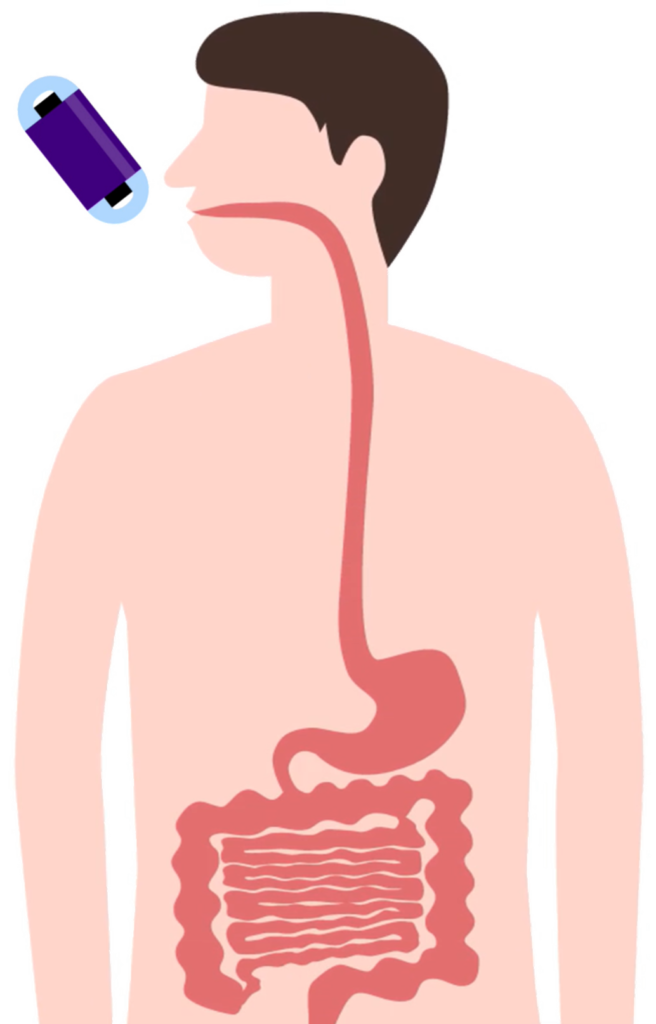Unveiling Our Latest Innovations in GI Diagnostics through AI in Capsule Endoscopy

We are excited to report that GI Digital was represented at the “The New Wave of AI in Healthcare 2024” conference to discuss AI in Capsule Endoscopy. Our very own, Hagen Wenzek, presented a poster titled, “Getting capsules into patients: Using AI to remove a critical barrier in scaling accurate GI diagnostics.”
This presentation delved into the transformative power of Artificial Intelligence in the domain of gastrointestinal diagnostics.
Video capsule endoscopy (VCE), a cornerstone of non-invasive GI diagnostics, involves a patient swallowing a small camera that captures crucial images as it travels through the digestive system.
While revolutionary, the manual analysis of the resultant voluminous data has historically been a significant bottleneck: Somewhere between 50,000 and 400,000 images are captured during the procedure and they usually have to be analyzed by a doctor.
At GI Digital, we have pioneered a Software-as-a-Medical-Device that employs sophisticated AI and Machine Learning algorithms to drastically enhance the efficiency and efficacy of VCE image analysis. Our AI-driven approach reduces the time required for a complete diagnostic review from the standard 20-90 minutes to a mere 5-10 minutes, improving not only the speed but also the consistency of reporting across studies. This capability is quickly becoming a core component of our service delivery model.
The poster will cover the technical aspects of our AI for Capsule Endoscopy models, their development, and the impressive results from our recent clinical study involving 674 patients from the NHS England and Scotland, led by the University Hospitals Coventry and Warwickshire NHS Trust and funded by the National Institute for Health and Care Research (NIHR) and Innovate UK.
This study validated the enhanced accuracy and performance of our AI-enabled system in detecting polyps, a common yet critical diagnostic challenge in gastrointestinal health.

For healthcare professionals, investors, and technology enthusiasts attending the conference, this will be a perfect opportunity to see firsthand how GI Digital is shaping the future of medical diagnostics. Our session will also open discussions on potential partnerships and collaborations as we continue to advance our technologies.
Join us at the conference to learn more about how our innovative solutions are making GI diagnostics faster, more accurate, and accessible. For more details about our session and to schedule a personal meeting during the conference, please reach out at [email protected].
Stay tuned for updates and insights from the conference, and be sure to follow us on LinkedIn and Twitter for real-time highlights!
Details & References
Meanwhile, here are more details about AiSPEED and references to the most important publications:
Video capsule endoscopy (VCE), a minimally invasive diagnostic modality, involves the ingestion of a small camera by patients to capture images of the gastrointestinal (GI) tract as it transits through the body [1]. This method has clinical and societal benefits as it can not only increase the diagnostic yield but also access to such tests. The major challenge associated with VCE studies is the large volume of data generated and labor-intensive, tiring manual analysis [2]. Among other factors, this is holding back any attempts to broaden the use of VCE across the world.
Integrating AI systems into the image analysis process has been a game changer to solve the main problem of this medical device. We have created a Software-as-a-Medical-Device using AI/ML to aid experts in interpreting the images, resulting in a more effective and efficient evaluation of VCE studies. The purpose of these methods is to decrease the time needed to analyze the images from 20-90 min to 5-10 min and enhance the consistency of reporting.
Various AI models are available to assist physicians during the reading process [3, 4], however the most common approach is through lesion detection. These AI methods are designed to recognize any abnormalities in the GI tract that may suggest the presence of pathologies [5, 6]. Our clinical study of 720 patients validated the accuracy and performance improvement of polyp detection using AI-enabled over non-AI-enabled reads [7]. The tool is now ready for certification and deployment.
[1] Iddan, G., Meron, G., Glukhovsky, A., and Swain, P. (2000). Wireless capsule endoscopy. Nature, 405 (6785), 417. https://doi.org/10.1038/35013140
[2] Horovistiz, A., Oliveira, M., and Araújo, H. (2024). Computer vision-based solutions to overcome the limitations of wireless capsule endoscopy. In Journal of Medical Engineering and Technology. Taylor and Francis Ltd. https://doi.org/10.1080/03091902.2024.2302025
[3] Laiz, P., Vitrià, J., Gilabert, P., Wenzek, H., Malagelada, C., Watson, A. J. M., and Seguí, S. (2023). Anatomical landmarks localization for capsule endoscopy studies. Computerized Medical Imaging and Graphics, 108. https://doi.org/10.1016/j.compmedimag.2023.102243
[4] Quindós, A., Laiz, P., Vitrià, J., and Seguí, S. (2023). Self-supervised out-of-distribution detection in wireless capsule endoscopy images. Artificial Intelligence in Medicine, 143. https://doi.org/10.1016/j.artmed.2023.102606.
[5] Laiz, P., Vitrià, J., Wenzek, H., Malagelada, C., Azpiroz, F., and Seguí, S. (2020). WCE polyp detection with triplet based embeddings. Computerized Medical Imaging and Graphics, 86. https://doi.org/10.1016/j.compmedimag.2020.101794.
[6]Gilabert, P., Vitrià, J., Malagelada, C., Watson, A., Wenzek, H., Laiz, P., Malagelada, C., and Seguí, S. (2022). Articial Intelligence to Improve Polyp Detection and Screening Time in Colon Capsule Endoscopy. Frontiers in Medicine, 9. https://10.3389/fmed.2022.1000726.
[7] Lei, I. I., Tompkins, K., White, E., Watson, A., Parsons, N., Noufaily, A., Segui, S., Wenzek, H., Badreldin, R., Conlin, A., and Arasaradnam, R. P. (2023). Study of capsule endoscopy delivery at scale through enhanced artificial intelligence-enabled analysis (the CESCAIL study). Colorectal Disease, 25(7). https://doi.org/10.1111/codi.16575.
